HumAnes of UCLA: Aline Toukhtarian, MD
Where did you grow up?
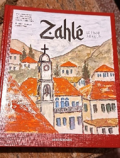
I grew up in Zahle, Lebanon. It is an old city situated at the heart of the Bekaa Valley. It has nice Mediterranean weather that is kind of close to the weather in Santa Monica. Zahle is very well known for its grapes, wine, and homemade Arak (Anise-based Mediterranean distilled spirit).
I am originally Lebanese-Armenian. My maternal and paternal grandparents are survivors of the Armenian Genocide. Here is an old picture of my dad as a 7-year-old boy and his family.
How did you end up in the US?
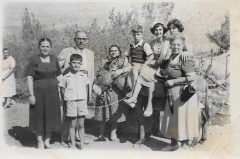
It’s a long story. But to sum it up, we were very close to the port of Beirut when the explosion happened on August 4, 2020. It was traumatizing to the extent that we decided to move to a more peaceful place. My husband was born and raised in Burbank, CA, and has a lot of family over here. So, we decided to move to LA.
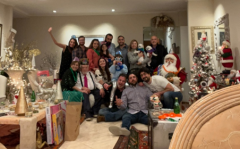
I wasn’t necessarily going to practice medicine when we moved because I wasn’t convinced of having to repeat all my study years all over again. However, I did decide to take my USMLE exams long after I received my MD degree just to have that option not entirely closed. Once I did my Steps, I applied to UCLA, and I am glad it all worked out.
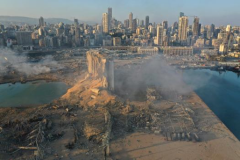
“A drone picture shows the scene of an explosion at the seaport of Beirut, Lebanon, Wednesday, Aug. 5, 2020. A massive explosion rocked Beirut on Tuesday, flattening much of the city’s port, damaging buildings across the capital and sending a giant mushroom cloud into the sky. More than 70 people were killed and 3,000 injured, with bodies buried in the rubble, officials said.” The Denver Post
Where did you complete your education and training, and how did you choose anesthesiology?
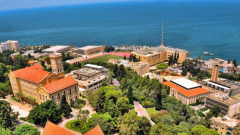
I completed my bachelor's degree in biology, my MD degree, and my anesthesiology residency at the American University of Beirut (AUB). I practically spent 11 years of my life there as a student to come back later as an attending for a year before I moved to the US.
When I was in medical school, I thought I would like to become a psychiatrist. But as I started shadowing as a medical student in psychiatry clinics, I realized that it could be really draining and might not be the right choice for me. So, I started thinking of a specialty that does not necessarily involve clinics.
The first thing that came to mind was Anesthesiology. I did an elective in Anesthesia and knew right away that it was the right profession for me. Though my father always wanted me to become a pathologist and open a laboratory thinking it would be an easy lifestyle and less stressful. I did apply for anesthesiology and laboratory medicine and did interviews in both. Though the medical lab and pathology department at AUB was extremely welcoming, professional, and friendly, I could not decide on becoming a pathologist, as I knew it might not be right for me.
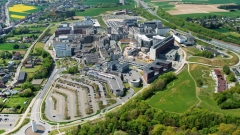
After I graduated as an anesthesiologist, I worked part-time in Eye & Ear Hospital International in Lebanon, where we provided anesthetic care for patients coming in for ophthalmic procedures and for children undergoing tonsillectomies and ear tube placement.
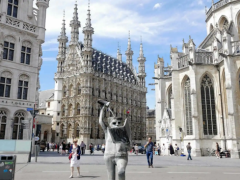
Afterwards, I travelled to Belgium to a historical university city called Leuven, where I did my fellowship in acute pain therapy and regional anesthesia at the University Hospitals of Leuven. It felt a bit challenging at that moment since I had to learn Dutch, but it was definitely worth it in hindsight. It is one of the best ESRA-accredited programs for regional anesthesia. I was able to perform more than 1800 blocks in one year.
The Catholic University of Leuven is the oldest existing Catholic university in the world. It dates back to 1425.
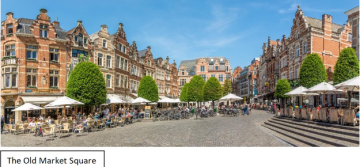
I came back to Lebanon from my fellowship with the intention to stay, and I started working one month right after the start of the COVID-19 pandemic. It was a weird time to start a new job because the market was overloaded with staff, especially now that all elective operations had come to a halt, with no definitive timing for when things would go back to normal.
What was your childhood dream?
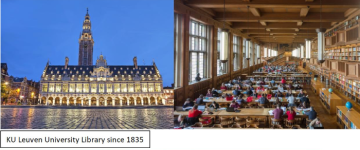
I do not know if I ever had an elaborate childhood dream, but I do know that I have always wanted to open a flower shop or work as a florist at least part-time or as a retirement plan. I love flowers. I love learning how to assort bouquets nicely. It relieves my stress.
Tell us a little about your family (including any pets).
I grew up in a family of two children—me and my older brother. Though miles and hours apart, we still are very close. We make the time to video call almost every day.
My hubby and I had a getaway wedding in 2019. Our family and friends flew from all over the globe to be there.
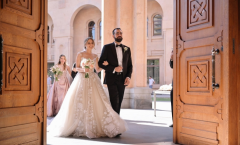
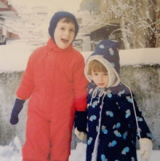
We welcomed our first newborn into this world in May 2023. We love dogs but do not have ones of our own. My family has 2 dogs back home. We used to have a Dobermann as children.
What do you like to do in your free time?
In my free time, I really enjoy spending quality time with my family, exploring different places, walking in nature, and trying new restaurants. I like meditating and practicing Yoga every now & then to unwind. These are pictures that I took while on a walk in my home town, Zahle.
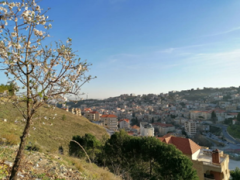
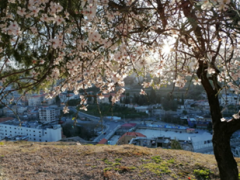
What is your favorite book, movie, or TV show, and why?
I do not have a specific genre of movies that I like. I like movies that have a certain message to relay that is applicable to real life. I usually avoid fiction in general, though there are some good ones… I really liked Jack Nicholson in Anger Management and Al Pacino in The Devil’s Advocate.
I am more of an old soul. I love oldies in general, and my favorite radio station back home is Nostalgie on FM radio wave 88.1. They play oldies, mainly French classics.
What is your favorite vacation destination?
My hubby and I really enjoy travelling—even when I was pregnant and when our baby was as young as 2.5 months old. We do not have a favorite vacation destination yet. We are still exploring… We would like to travel to Australia and Japan one day…
What do you enjoy the most about your job?
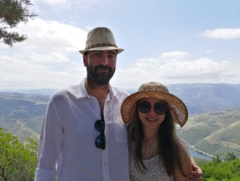
I like that I get to meet different people every day through my job and learn about their backgrounds, passions, and favorite travel destinations. I also like that I can provide care for people who may be in their most vulnerable state and help them feel better. I like regional anesthesia, specifically for giving me the skill set necessary to block the pathway for severe pain on the spot and relieve people’s pain. Working during the COVID pandemic also opened our eyes to the importance of our job serving our community.
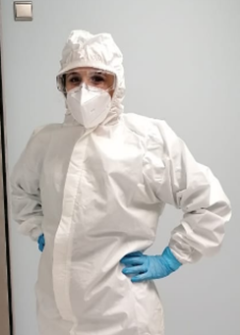
How is anesthesiology practiced differently in the US?
Anesthesiology is pretty much practiced the same everywhere. What differs, however, is the patient population. Obesity is more common in the US in general, and the diseases associated with it are consequently seen in more severe forms. Cigarette smoking, on the other hand, is more common in Lebanon. We would deal with more severe cases of COPD and lung disease over there. Weed smoking is more common over here. Lung and heart transplant procedures are also more commonly performed over here, making the population survive longer. Some types of cancers might be more common over there in some areas with higher pollution levels. This shapes how we practice anesthesia.
The practice of anesthesia is otherwise very similar, with the exception of the availability of some drugs. Opioids are more openly used to treat post-surgical pain in the US. In Lebanon, opioids are reserved for oncologic patients, patients with chronic pain, and end-of-life care. Opioid prescription is very strictly regulated by the Ministry of Public Health (MOPH). Only oncologists and chronic pain specialists are allowed to prescribe opioids in the outpatient setting. That is very different from the US.
Target-controlled infusion (TCI) pumps are also commonly used in Lebanon for total intravenous anesthesia (TIVA), as opposed to their absence in the US because of FDA approval issues.
I have done a bunch of rotations outside Lebanon during my medical training and residency. I have rotated in Olomouc, Czech Republic. I have studied in Belgium. I have rotated in Montefiore in the Bronx and in Cook County in Chicago. All in all, I found that the practice of anesthesia is pretty much similar around the world. Lebanon might be more affected than the US by the “European way” of practicing anesthesia.
In Lebanon, there are two pathways to receive a medical degree. The European, more specifically the French way, entails enrolling in medical school from the start after graduating from high school. The second pathway is the American way, in which a high school graduate gets a bachelor’s degree first as a pre-medical student, and then applies to join the school of medicine.
I come from the American University of Beirut. So, my medical journey was similar to an American graduate. Although most of my teachers are American graduates, I also had some teachers who graduated from European schools. Consequently, I would describe the medical training that I received as a blend of the two.
How would your friends & family describe you?
I do not know how to answer this question. You should ask them… ☺